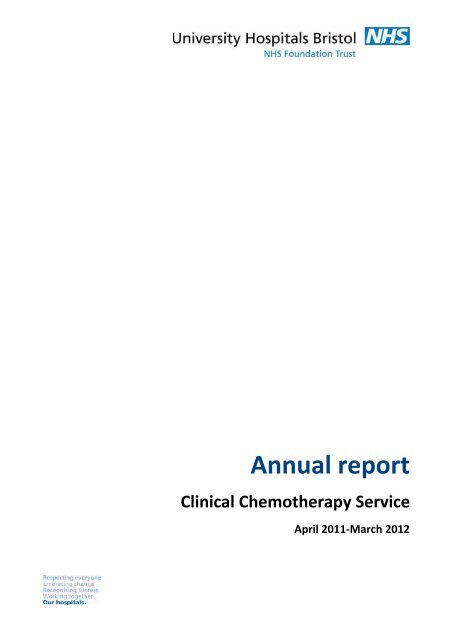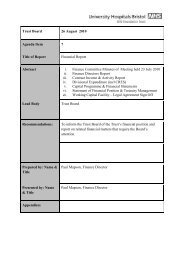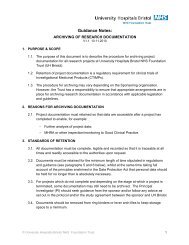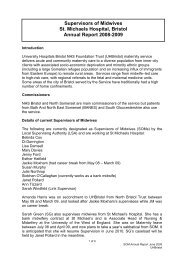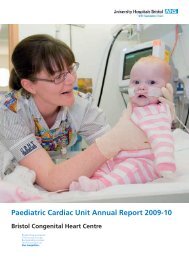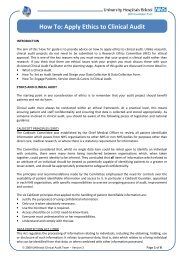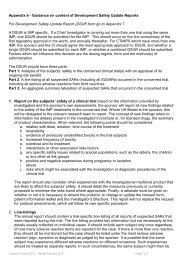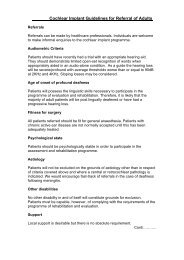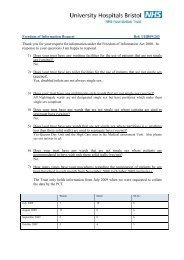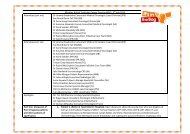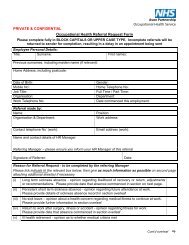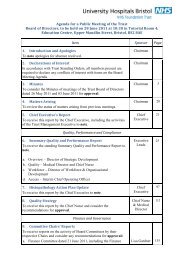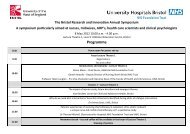Clinical Chemotherapy Service - United Bristol Healthcare NHS Trust
Clinical Chemotherapy Service - United Bristol Healthcare NHS Trust
Clinical Chemotherapy Service - United Bristol Healthcare NHS Trust
Create successful ePaper yourself
Turn your PDF publications into a flip-book with our unique Google optimized e-Paper software.
MeasureNumberMeasureOperationalPolicyAnnualReportWorkPlanSupportingInformation11-3S-101 Head of <strong>Service</strong> Responsibilities p13 p7-811-3S-102 Lead <strong>Chemotherapy</strong> Nurse p13-15 p8-1511-3S-103 Named Wards p20 p16-1711-3S-104 Specified Room Policy p20 p16-1711-3S-105 Provision of Protocols and Equipment p20 p16-1711-3S-106 Temporary Storage and Preparation Area p2111-3S-107 The <strong>Chemotherapy</strong> Multi-professional Team p17-18 p18-2211-3S-108 Multi-professional Team Meetings p18 p9 p23-2511-3S-10911-3S-110Representation on the Drugs and TherapeuticCommitteeRepresentation on the Network <strong>Chemotherapy</strong>Group11-3S-111 Error Recording and Reporting p30 p2611-3S-112 Further Pre-Treatment Consultation p25 p27-28p18p1811-3S-113 Patient Identification Procedure p2511-3S-114Checks Prior to the Prescription of the FirstCyclep10p25 p27-2811-3S-115 Checks Prior to Administration p25 p40-5511-3S-116 Training and Assessment Policy p22 p29-3411-3S-117 Assessors of Competence p22 p35-3711-3S-118 Named Areas of Competence p2211-3S-119 Training Records p2211-3S-120 Agreed List of Treatment Algorithms p2411-3S-12111-3S-122Policy for Preventing Regular Deviation fromthe NSSG Agreed Treatment Algorithms<strong>Clinical</strong> <strong>Chemotherapy</strong> <strong>Service</strong> TreatmentProtocolsp24 p11 p38-3911-3S-123 Guidelines and Protocols p26 p40-5511-3S-124Guidelines and Protocols for SystemicTherapy Acute Oncology Presentationsp25p26 p40-5511-3S-125 Hospital Guidelines and Protocols p26 p40-5511-3S-126 24-hour Telephone Advice <strong>Service</strong> p31 p61-6211-3S-12711-3S-128Information for Patients on Complications of<strong>Chemotherapy</strong>Regimen Specific Information onComplicationsp32-3311-3S-129 Consent Form p33p33 p60-61Page 3 of 13
MeasureNumberMeasureOperationalPolicy11-3S-312 Administration by ST1 or ST2 Medical Staff N/A11-3S-313 Storage in Pharmacy p23AnnualReportWorkPlanSupportingInformation11-3S-314 Issuing of ITC drugs p23 p82-8311-3S-315 Sequencing IV and IT <strong>Chemotherapy</strong> p23 p84-8611-3S-316 Labeling of ITC drugs p23 p84-8611-3S-317 ITC Prescription Chart p23 p82-8311-3S-318 Collection of ITC drugs p2311-3S-319 Storage Outside Pharmacy p2311-3S-320 Designated ITC Room p1211-3S-321 ITC Checking Procedure p26 p87-8911-3S-322ITC Administration within Normal WorkingHoursp21p11Page 5 of 13
1. IntroductionThis Report relates to the operational period April 2011-March 2012.Key achievementsPositive external review for intrathecal chemotherapyBetter recording of chemotherapy clinical incidentsGood achievement in first year of peer review measuresKey challengesCommunity chemotherapy strategy and expansion of services to cover patients throughout<strong>Bristol</strong>, North Somerset and South Gloucestershire.Support out-of-hours and access out of BHOC for ChemoCare electronic prescribingsystem.Support for ChemoCareTimely delivery of drugs to clinical areasFurther extension of community chemotherapyProvision of information to meet requirements for Systemic anti-cancer therapy (SACT)data setPage 6 of 13
2. Workload of clinical chemotherapy serviceThe table below shows all admitted activity at BHOC during the time period. The coding system is currently unable to separate out purely chemotherapy related activity, how this gives an indication ofall elective activity, which is either chemotherapy or supportive care. This does not include any emergency or non-elective chemotherapy or chemotherapy given on an outpatient basis.WardApr-11May-11Jun-11 Jul-11Aug-11Sep-11Oct-11Nov-11Dec-11 Jan-1260B 456 475 491 447 522 518 531 551 492 529 460 484 595660C 31 31 37 29 41 46 29 46 42 36 31 33 43260E 2 1 1 2 660H 98 96 103 80 72 91 68 74 89 112 99 107 1089Day Case 60P 5 10 6 3 3 5 6 4 4 16 4 6 7261 2 1 2 9 4 4 7 2 3 3 3762 1 2 1 1 562A 90 74 65 60 67 54 55 53 73 58 60 58 76764 1 160B 6 1 16 1 2 2 6 8 2 5 4 5360C 1 1 1 360H 2 1 3Inpatient60P 1 2 1 1 3 1 961 62 62 69 58 63 75 65 82 79 81 62 76 83462 4 6 4 5 4 7 3 1 1 2 3 4062A 1 1 1 1 1 572 1 1Grand Total 754 759 794 686 780 809 770 827 790 842 724 778 9313Feb-12Mar-12GrandTotalWorkload of intrathecal chemotherapy service(11-3S-304) The intrathecal case volume per year for the last 2 years is: 01/04/2010-31/03/2011 = 545Page 7 of 13
01/04/2011-31/03/2012 = 622The results of the high volume risk assessment and actions to manage capacity are detailed in the Intrathecal policy under ‘<strong>Service</strong> Capacity’. This is available onthe <strong>Trust</strong>’s document management service here and has been reviewed as part of the peer review process. An external visit to validate the risk assessment wasundertaken on 2 nd March 2012 by the Peninsula Cancer Network. The visitors reviewed policies and checked facilities in much the same way as an external peerreview visit would do. The review was extremely positive, the summary of the report is copied below:Summary:The external review of BHOC consisted of two elements; review of policies & procedures and a facilities review. The written evidence provided before and during thereview was high quality, evidence based and demonstrated the commitment to patient safety. The national peer review measures showed compliance score of 100%yet the foresight to challenge their practice with an external review.All three clinical areas were compliant with national guidance, were able to demonstrate the various stages involved in ITC delivery and interpret how the patientexperience was integral to their work.It was clear to the reviewers that the services are led by strong leaders in all fields whom are committed to patient safety and high quality care and experience. Eachmember of the team was appeared to be highly competent in their field however were also able to challenge their practice despite a high volume service.The full report is available in the supporting information on pages 69-73.Page 8 of 13
3. BHOC chemotherapy multi-professional team meeting attendance(11-3S-108) BHOC chemotherapy group Summary of meetings between April 2011 and March 2012including attendance showing “specialisms” of attendees.All past papers, minutes and agendas are available on a shared team workspacehttp://workspaces/Teams/BHOC<strong>Chemotherapy</strong>Group/default.aspxAttendance record April 2011-March 2012:Name Surname Professional SpecialismLiz Allison Nursing <strong>Clinical</strong> Trials Y X YTracey Arthur Nursing Avon Haematology Unit Y Y Y Y Y Y YJane Bailey Nursing BHOC matron n/a Y Y YClare Bidgood Nursing Other X XCheryl Bradley Nursing Ward 61 Y n/a Y Y YConsultant oncologist andY Y Y YJeremyDoctor lead doctor for chemotherapyBraybrooke(chair) Y Y YSheryl Cabusara Nursing Avon Haematology UnitAlison Cameron Doctor ConsultantCathy Chesham Other <strong>Trust</strong> <strong>Service</strong>s XHelen Cooper Nursing <strong>Chemotherapy</strong> Day Unit Y Y Y Y YDeanne Cox Other Administration Y YAndreaBHOC pharmacy/ParenteralY YPharmacyDahlgrenSupport Unit representatives Y YNathalieHospital managementY Y Y YDelaney Management representative Y Y YRoger Evely Doctor Consultant HaematologistDeniseBHOC patient servicesY Y YManagementGibsonmanager Y XClareSister for chemotherapyY Y YNursingGreatorextraining and development Y Y YJosie Green Other ChemoCare representative X Y YGeorgina Hannay Other Administration Y Y Y Y Y YRaeBHOC lead nurse forY Y YNursingHerringtonchemotherapy X Y YFionaHospital managementYJones Management representativeTamerBHOC pharmacy/ParenteralYYPharmacyLatifSupport Unit representatives Y YMarcBHOC pharmacy/ParenteralYYPharmacyLennonSupport Unit representativesYHayley Long Nursing BHOC matron YOonaghBHOC pharmacy/ParenteralY YPharmacyMcGrathSupport Unit representativesYSarahBHOC pharmacy/ParenteralY YPharmacyMurdochSupport Unit representatives YSam Roles Nursing Ward 61 Y Y YTara Shine Nursing Acute oncology n/a n/aAngela Webb Nursing <strong>Clinical</strong> TrialsPaula Wilson Doctor BHOC clinical governance lead X X Y11-Oct-1112-Jul-1124-May-1112-Jul-1106-Sept-1111-Oct-1113-Dec-119
(11-3S-110) ASWCS network chemotherapy group (NCG)Meeting Date Name Job Title15 th April 2011 Jeremy BraybrookeAndrea DahlgrenConsultant OncologistDivisional Lead Pharmacist15 th July 2011 Jeremy BraybrookeAndrea DahlgrenConsultant OncologistDivisional Lead Pharmacist21 st October 2011 Jeremy BraybrookeAndrea DahlgrenConsultant OncologistDivisional Lead Pharmacist13 th January 2012 Jeremy Braybrooke Consultant Oncologist24 th February 2012 Jeremy Braybrooke Consultant Oncologist% attendance 100%Page 10 of 13
4. MonitoringException reporting(11-3S-301) Not applicable to UH <strong>Bristol</strong>(11-3S-121) Record of off-protocol prescriptions is patient identifiable and therefore not included here.The record was checked and verified as part of the peer review process. There were 37 instances of offprotocolprescribing in the review period. The patient’s name, regime and indication are completed. Awide variety of indications and regimes are covered.(11-3S-138) There have been 10 initiations of chemotherapy out-of-hours in the review period, all madeaccording to the policy.(11-3S-322) Emergency ITC administrations are all reviewed at the ITC meeting. There were no emergencyadministrations of ITC during the review period.Morbidity and mortalityDeaths within 30 days of chemotherapy treatment are reported and discussed at the BHOC morbidity andmortality meetings. A manual system of collection is currently in place and the divisional data analyst isworking with <strong>Trust</strong> analysts to robustly capture this through electronic systems.Capacity and demand planning(11-3S-137) Further progress has been made in the review period on populating CPORT. Numbers havebeen updated to reflect April 2011 – March 2012 for patients receiving chemotherapy for oncology.Haematology is still in development. All standard regimens have been inputted and oncology clinical trialsare in the process of being added. Supportive therapies and patient number have also been inputted, usingdata from Mosaiq. Staff resources have been inputted accurately based on actual numbers on CSU. Oralchemotherapy is not included as this does not usually affect numbers on the CDU. The team are planningto run some test simulations next.Page 11 of 13
5. Audit<strong>Chemotherapy</strong> services<strong>Chemotherapy</strong> services are part of BHOC audit programme.Intrathecal chemotherapy servicesITC audits in the past year include an audit “Is Intrathecal <strong>Chemotherapy</strong> being correctly administered onWard 62?” and “Re-audit of our compliance to the new DOH guidance on Intrathecal <strong>Chemotherapy</strong> andNPSA RRR on Administration of Vinca Alkaloids”. Copies of the audit presentations are included in theevidence folder.Pharmacy services(11-3S-205) PSU is an unlicensed unit, and is therefore audited externally by the Regional Quality AssurancePharmacist. The last audit was carried out 24 th August 2010, and the next is planned for November 2012.This is outside the eighteen months required for peer review, and is due to the limited availability ofthe Quality Assurance Pharmacist. The <strong>Trust</strong> was considered to be low risk based on previousassessments and therefore the visit was prioritised lower than those to other areas. Thereforewhilst this means the measure is not technically met, it is as a result of the <strong>Trust</strong>’s previoussuccess in this area.6. Patient and carer feedback and involvement(11-3S-130)Page 12 of 13
Patient and carer feedback is gathered in a number of ways.‘Patient experience boards’ were put up as part of the Patient Experience project (November 2008). Theyare located in clinical areas of BHOC. Patients write on comment cards and then display these on the boardin the relevant area. There is a designated lead for each area responsible for reviewing and responding tocomments, who checks the board at least one a month. A handwritten response (ideally in a differentcolour ink) is added to the card, including action taken. Cards are then put back up onto the board fordisplay with responses.The <strong>Trust</strong> participates in the national cancer patient experience survey and formulates an action plan basedon the results. The survey is sent to all patients who have had an inpatient admission for cancer, whichincludes many chemotherapy patients. The survey includes questions about the information given topatients, if they were offered a written summary of their care plan, and whether they were treatedholistically as a person rather than a ‘set of symptoms’. It isn’t possible to separate out the results relatingspecifically to chemotherapy, other than question 57; ‘staff did everything to control the side effects ofchemotherapy’. The <strong>Trust</strong> scored 83% for this question, which is in line with the national average. Actionsare being taken forward at a <strong>Trust</strong>-wide level and by the individual MDTs as appropriate.The newly established BHOC Acute Care service has been collecting specific feedback from patients withcomplications of chemotherapy, which has shown a high percentage of patients are aware of possiblesymptoms to look out for and what to do if they occur, as well as positive feedback on the service itself.Compliments and complaints are logged and responded to. All complaints have an action plan. This isreviewed by the Head of Nursing to ensure actions have been completed. Some complaints are reported tothe <strong>Trust</strong> Board and Divisional Board as a patient story. Summary reports including themes are reportedquarterly to the BHOC <strong>Clinical</strong> Governance group.Page 13 of 13


